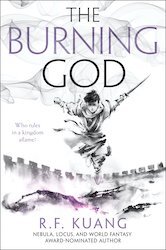Review: The Burning God (The Poppy War #3)
/3 stars. Oh god, summarizing this is going to be impossible. Ermm, okay. Freshly recovered (sort of) from the betrayal, heartbreak and violence of her failed tour with the Dragon Republic, Rin faces ... well, more betrayal, heartbreak and violence on her quest to unite the Nikara Empire against threats both foreign and domestic (heh). Unsure who to trust or where to go, she utilizes the intense power of the original shaman rulers, the blind obedience of the people from her Southern home and her own hungry, vengeful, trauma-laden instincts to ensure survival for herself and for her people.
Don't hate me. It is what it is. I absolutely adore R.F. Kuang and hold her in the highest regard. Her writing is spectacular and she's so talented - her intellect is obviously very high and I can't wait to read what she does next. I admire what she's done here - channeled buckets of Chinese history and lore and context into a story for readers like myself who shamefully know so little about it. She's carved a space for herself in an impossibly small and impossibly male group of military fantasy writers. She has unlocked so much about what the standard trilogy could look like. She's wonderful.
But for most of this book I lost a level of investment in reading and felt ... almost ... bored? I mean for all the battles and bloody mysteries and character revelations, I dragged my feet to pick it up. Which I think came down to this: Why? And after surviving multiple wars, calling a god, committing genocide, and switching allegiances multiple times, what exactly does Rin want? Does she want to rule? Does she REALLY? Does she really want to forge peace? She wants to be part of the action, of course, but I had a hard time following her true, long-term motives. She's always being sent here or carried there or going somewhere on an episodic rescue mission. Her loyalties always seem to be to people, or power, or petty "sides" that are ultimately arbitrary. Never goals or even, like, an end game. An end to the journey.
And maybe that's partly the point. Maybe I missed my cues due to lack of focus and energy because, lol, 2021. Maybe she's meant to be a little untethered, a little destined to make bad choices. Maybe she can't see beyond a single day of survival for herself and her friends because she's walking around with so much trauma and baggage. Maybe I'm reading this with a decidedly Western perspective. And also she's what, 20 years old? I get that she's meant to be an unlikeable, untraditional, impulsive, blood-driven, power-hungry, brutal protagonist. But for most of The Burning God I was totally adrift with her, and not in a good way. I just ... burned out. No pun intended. I truly expected to want to live and breathe these characters for one final act. Instead I basically skimmed, wondering - again - why and also get on with it.
So, only a 3-star read for me.
A couple of other things:
The ending was perfect in premise, abrupt in execution.
I really missed in The Burning God the deep exploration of the gods and the pantheon and shamanism in general. This was prevalent in the first book, a subplot in the second, and barely part of the third. The only part where I really perked up is when Rin trained the new shamans.
I really loved this: amateurs obsess over strategy, professionals obsess over logistics.
Kuang asks a lot of her readers (IMHO) in terms of the various multiple names for people and places. I relied on the map a ton and am still a little unclear on who is who in the Trifecta and that whole history.
The Hesperians storyline is brilliant. Kuang demonstrates a unique if not super unveiled way of writing about colonialism, and for the most part it's successful. Petra's ending was ... delicious.
This is going to make an absolutely excellent TV series. It's practically ready for adaptation. I'm in. All the way.
The Burning God on: Amazon | Bookshop.org | Goodreads

